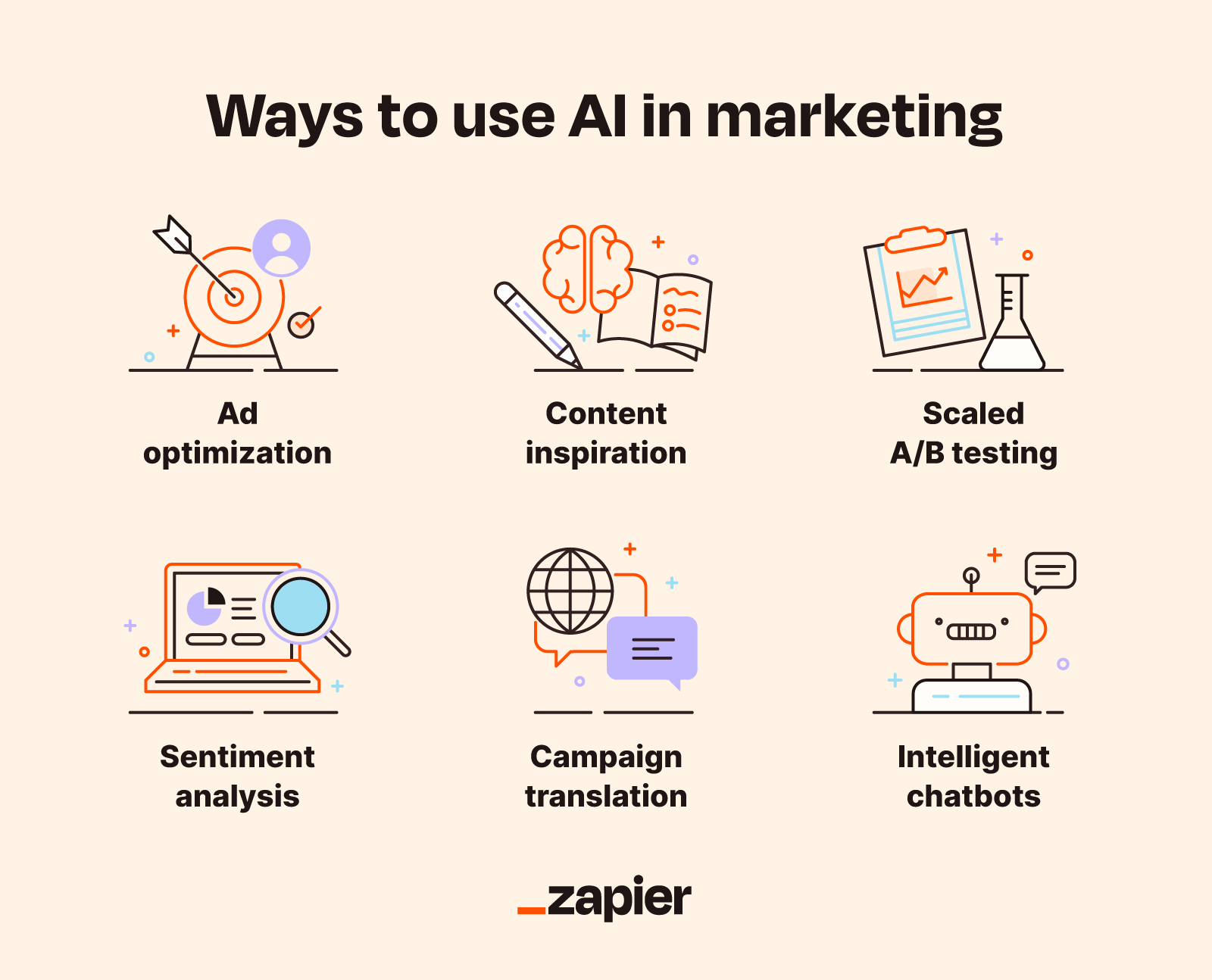Have you ever wondered if there’s a smarter way to handle your marketing efforts, leveraging the power of technology to boost your results? Artificial intelligence (AI) might just be the game-changing tool you’re looking for to revolutionize your marketing strategy.
How is AI being used in marketing? AI is transforming marketing through data analysis, natural language processing, media buying, automated decision-making, content generation, and real-time personalization, enabling businesses to improve targeted ad placements and create personalized content for enhanced consumer targeting and relevance.
Ready to dive deeper into the world of AI in marketing? Stick around as we explore how AI technologies are shaping modern marketing tactics and the ways you can harness these tools to level up your marketing game.
What is AI Marketing?
AI Marketing, a novel trend in the business world, uses the power and precision of artificial intelligence technologies to improve marketing units’ performances. The strategy lies in automating decisions based on data analysis, collection, and additional observations, all focused on detecting and deciphering audience trends. This understanding is pivotal in grasping how AI is reshaping the current marketing landscape.
Should we view AI as a pitch-perfect tool for data interpretation, or a futuristic novelty that’s all the rage in the tech sphere? The answer lies in understanding the essential function of AI: transforming raw data into actionable strategies. And it’s this transformative ability that is making waves in industries across the board, particularly in marketing.

Source: Zapier
AI Marketing Tools and Platforms
While the concept of AI Marketing might seem a tad bit overwhelming at first, once you break it down, it’s essentially made up of two primary components: data management and insight creation. AI marketing platforms step in to handle these two areas effectively. They manage vast volumes of data and interpret them to provide marketers with insights, enabling more informed marketing decisions. Given the growing importance of data-driven strategies, these platforms are becoming crucial to marketing success.
But how does a platform manage data, and what kind of insights can it generate? The tools underpinning these platforms are the answer. These include machine learning algorithms, big data analytics, and AI central management platforms for managing the insights. These platforms act as the technological backbone of AI marketing, making it possible for businesses to integrate AI into their marketing workflows seamlessly.
Current AI Marketing Use Cases
If AI in marketing seems abstract, it’s because the term masks a wealth of activities that are reshaping the marketing paradigm. Among its various applications, AI is currently used to facilitate data analysis, natural language processing, media buying, automated decision-making, content generation, and real-time personalization. Not only does this highlight how AI is diversifying marketing efforts, but it also illustrates AI’s role in enhancing consumer targeting and content relevance.
For instance, businesses employ AI to improve targeted ad placements, ensuring that their promotional content is seen by the right audience at the right time. Similarly, AI is also used to create personalized content. Instead of sending mass communications that are interpreted as spam, businesses can send targeted messages that resonate with individual customers and prompts action. This paradigm shift, enabled by AI, is helping marketers create more impactful marketing strategies.
Challenges for AI Marketing
While AI’s ability to transform marketing is undeniable, the approach isn’t without challenges. For one, AI marketing tools rely heavily on data – the quality and quantity of data directly impact the tool’s effectiveness. Limited or poor-quality data can stifle insight generation and lead to flawed decision-making.
In particular, these tools require thorough training with high-quality data. This training may take time, thereby slowing down the implementation and optimization of AI initiatives. Additionally, the need for adherence to data protection laws and maintaining consumer trust raises concerns over privacy. It also takes time to get buy-in from stakeholders, who may be skeptical about AI’s benefits or cautious about the investment it requires.
Ultimately, the adoption of AI in marketing hinges on successfully managing these challenges and leveraging inherent opportunities. As technology improves and data privacy regulations evolve, businesses have a vast opportunity to harness the game-changing power of AI in their marketing efforts.
In our other article [Can Marketing Be Replaced by AI? [Insiders Tips]](https://allbound.marketing/can-marketing-be-replaced-by-ai/), we delve deeper into whether AI can entirely take over the marketing domain or it will only be an assisting force contributing to the improvement of the marketing efforts.
Information Source: Artificial Intelligence And The Future Of Marketing
To wrap up, AI Marketing harnesses the predictive power of technology to create personalized, efficient, and effective marketing strategies. It’s the merging of tech capabilities and marketing savvy that opens up a world of possibilities, from data analysis to content generation. However, as with any emerging technology, it presents its own set of challenges, primarily relating to data management and ethics. The future of marketing rests on how well we can navigate these challenges and turn them into opportunities for unprecedented growth.
Establishing Clear AI Marketing Goals
Success in AI marketing begins by identifying areas of improvement and setting Key Performance Indicators (KPIs). These goals provide a roadmap for the effective deployment of AI tools, ensuring that they serve the primary purpose of enhancing business objectives. For instance, if your goal is to increase customer engagement, you might employ AI tools to automate personalized content creation.
Data-driven decision-making plays a crucial role in setting these goals. By leveraging past data about consumer behaviour and customer profiles, businesses can identify trends and patterns that can inform their marketing strategy. This historical data provides a solid foundation to predict future behaviour, allowing business leaders to make informed decisions about where and how to deploy AI technologies in marketing.
Data Privacy and AI Marketing Tools
In an era where data privacy has become a paramount concern, businesses must adhere to stringent laws and regulations surrounding data protection. These standards, such as the General Data Protection Regulation (GDPR), ensure that customer data is used ethically and securely. Ignoring these legislations can result in severe penalties, damaging businesses both financially and reputation-wise.
Applying AI in marketing should thus not compromise on data privacy. AI tools can, and should, be programmed to follow legal guidelines to avoid excesses in consumer data usage. Ensuring compliance with data protection laws builds trust and confidence among customers, a vital marketing necessity in and of itself as it enhances brand reputation and influences consumer decision-making processes positively.
AI-Driven Data Analysis for Customer Insights
AI technology enables businesses to produce customer insights through predictive analytics, thereby understanding product interests and behaviour. AI marketing tools can then leverage these so-called big data, using machine learning algorithms and datasets to accurately predict future behaviour. According to Bernard Marr on Forbes, “AI marketing tools allow marketing teams to make the most of this data using predictive analytics, which combines machine learning algorithms, models, and datasets to predict future behaviour.” This capacity to anticipate customer needs enhances the overall ability of a business to execute data-driven marketing strategies.
The Role of AI in Content Generation and Personalization
AI is not only transforming data analysis but also content creation. Today, AI-generated content creation and dynamic pricing strategies are becoming increasingly effective, especially for the retail industry. By tailoring content to consumer behaviour and adjusting pricing based on demand, businesses can bypass the traditional “one-size-fits-all” approach to marketing.
Moreover, not only is AI marketing proving beneficial within the retail industry, but its robustness is also being leveraged in diverse sectors such as finance, entertainment, and healthcare, highlighting its vast potential to optimize marketing strategies. As explained in the Harvard Business Review, “Companies should take a stepped approach, starting with rule-based, standalone applications that help employees make better decisions, and over time, deploying more-sophisticated and integrated AI systems in customer-facing situations.”
Ultimately, AI is redefining the marketing landscape, but its successful implementation requires clear goal-setting, strict adherence to data privacy standards, and using its capabilities to enhance data analysis and content personalization.
Frequently Asked Questions
Q: What are Key Performance Indicators (KPIs) in AI Marketing?
Key Performance Indicators (KPIs) in AI Marketing are measurable values that help businesses understand the effectiveness of their AI marketing strategies.
Q: What is GDPR?
GDPR, or General Data Protection Regulation, is a regulation in EU law on data protection and privacy. It seeks to give individuals control over their personal data and simplifies the regulatory environment for international businesses.
Q: How does AI help in predictive analytics?
AI helps in predictive analytics by using machine learning algorithms to analyze historical data and make predictions about future outcomes. This enables businesses to anticipate customer needs and behavior effectively.
Q: How does AI contribute to content creation?
AI contributes to content creation by generating personalized content tailored to individual consumer behavior. It automates the content creation process, allowing for more timely and relevant content distribution.
Q: Is AI used only in retail marketing?
No, AI finds its applications in diverse sectors beyond retail, such as finance, entertainment, healthcare, and more. Its versatility in optimizing marketing strategies is recognized across industries.

